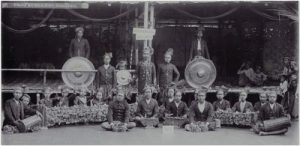 Bali still has a very traditional society and the late Made Wijaya went so far as to say a ‘medieval’one, albeit existing and functioning in the modern world. In this sense, the way Balinese society operates is still far from democratic or equal in the Western “free world” sense of the word. Men still make family and community decisions; are community leaders; and are required to be present at community meetings. Ceremonial preparation tasks are divided based on gender lines and men and women socialize only with the same sex due to this division. For example, you will see men and women in groups separated from each other: women making offerings and men slaughtering animals or preparing food.
Bali still has a very traditional society and the late Made Wijaya went so far as to say a ‘medieval’one, albeit existing and functioning in the modern world. In this sense, the way Balinese society operates is still far from democratic or equal in the Western “free world” sense of the word. Men still make family and community decisions; are community leaders; and are required to be present at community meetings. Ceremonial preparation tasks are divided based on gender lines and men and women socialize only with the same sex due to this division. For example, you will see men and women in groups separated from each other: women making offerings and men slaughtering animals or preparing food.
The Hindu caste system that Bali adopted from India (fortunately without the ‘untouchables’ category) is obviously undemocratic and – even though officially obsolete due to colonization, independence and eventually instatement of a democracy – is still applied in terms of language and civilities.
In terms of inheritance, traditionally (and this still applies today in most families) everything goes only to the sons. Also, men are always the head of the household and therefore make all the important decisions.
There are hardly any instances in Balinese society where democracy and equality are fully applied. Gamelan, however, is the exception. Anyone can play gamelan: all genders, all ages, all ethnicities, all sexualities, the diffabled.
The earliest documentation of women playing gamelan is a photo from Singaraja in the late 19th century. I also found a photo of dwarfs playing in an ensemble in North Bali from the same time period. Even though I have never seen documentation of children playing gamelan this far back in history, based on the stories of teachers from the early 20th century it was not only permitted but encouraged. Today many women play gamelan, not only as exclusive female ensembles but also mixed with men. They are accepted to play any instrument and now compete directly with men.
When there is a decision to make, the whole group is involved – a decision is made based on the majority vote, not on that of the leader of the ensemble. This applies to everything, including finances, and is essential to the strength and continuity of the group as a whole.
More on democracy and equality in gamelan in the next edition of Kulture Kid.
By Vaughan Hatch
Copyright © Kulture Kid 2019
You can read all past articles of
Kulture Kid at www.BaliAdvertiser.biz